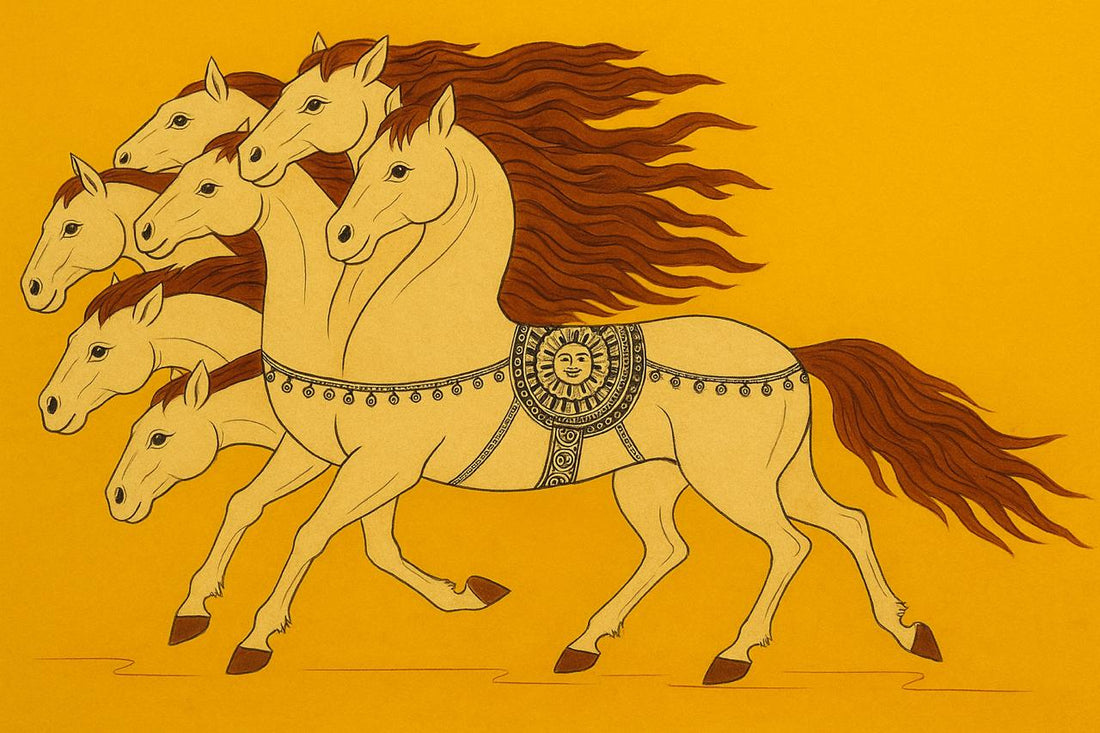
Ucchaihshravas: The Celestial Steed Born of the Churning Ocean
Share
Ucchaishravas's origin is one of the most striking in Hindu mythology, though he's not the first name mentioned. He was not born from the earth, nor was he created by a god. He rose out of a moment that changed the universe: the Samudra Manthan, the churning of the ocean of milk.
That story, found across many Hindu texts, describes a rare alliance between the gods (Devas) and demons (Asuras). Together, they churned the vast cosmic ocean to retrieve Amrita, the nectar of immortality. They used Mount Mandara as the churning rod and the enormous serpent Vasuki as the rope. The process was chaotic and even dangerous. From the ocean came poisons, treasures, and divine beings, some welcome and others not.
Among the most beautiful things to appear was Ucchaishravas, a seven-headed white horse that shone brighter than anything else around it. He did not carry weapons or roar like a lion, but his presence was impossible to ignore. He was not just another horse. He was the finest of his kind, flawless in form, untouched by the violence unfolding around him.
Naturally, the gods took notice. Indra, king of the heavens, claimed Ucchaishravas as his own. In mythology, ownership often has less to do with need and more to do with meaning. For Indra, riding the divine horse was not about transportation. It was about status, authority, and validation. Ucchaishravas became a symbol of Indra’s place at the top of the cosmic order.
But the story does not end there. The Asura king Bali, powerful and wise in his own right, also wanted the horse. In some versions of the tale, Bali even takes Ucchaishravas. This was not necessarily due to jealousy, but rather because Ucchaishravas symbolized a deeper meaning: divine recognition. Having such a being by his side was a cosmic endorsement that even immortality could not provide.
Ucchaishravas’s value was not in what he could do, but in what he stood for. He embodied purity, grace, and authority in a tangible form. The very fact that gods and demons both wanted him says everything about the power of symbols in Hindu storytelling.
He is mentioned in the Bhagavad Gita as well. When Lord Krishna explains to Arjuna that he exists in all forms of greatness, he says, “Among horses, I am Ucchaishravas.” That one sentence elevates the horse from a mythological figure to something even more important: a reflection of divinity itself.
And yet, Ucchaishravas is not worshipped. There are no temples in his honor, no prayers offered at dawn, and no rituals passed down through generations. But that does not mean he was forgotten. He still appears in scriptures, in temple carvings, and in stories passed between generations. His presence lingers quietly.
No one has ever clearly explained the meaning behind his seven heads. Some say they represent the seven heavens, or the seven forms of wisdom, or the seven winds. Others believe the number is simply symbolic of completeness. In the end, the mystery is part of the character.
Why is he important? Why does a silent, perfect horse matter in the grand scheme of cosmic mythology?
Ucchaishravas represents what emerges when the universe is in turmoil. He is the proof that even in moments of violent transformation, when demons and gods are tearing the cosmos apart, beauty, order, and clarity can still rise. He reminds us that not all power is loud, and not all divinity is forceful. Sometimes significance lies in stillness, in being the embodiment of perfection when the world is fractured.
His presence is a message: grace and truth do not need to conquer; they just need to exist. Ucchaishravas is important because he does not serve a single deity or cause. He embodies cosmic balance, appearing not as a tool of war or a guardian of treasures, but as a symbol of the divine that transcends conflict.
What makes Ucchaishravas compelling is not that he fought epic battles or granted boons, but that he existed at the exact point where chaos gave birth to beauty. While gods fought for immortality and poisons spilled from the ocean, this white horse emerged, elegant, perfect, and completely at peace.
There is something powerful in that. Not all divine beings shout their purpose. Some just appear when the world is coming apart and remind everyone what balance looks like.
